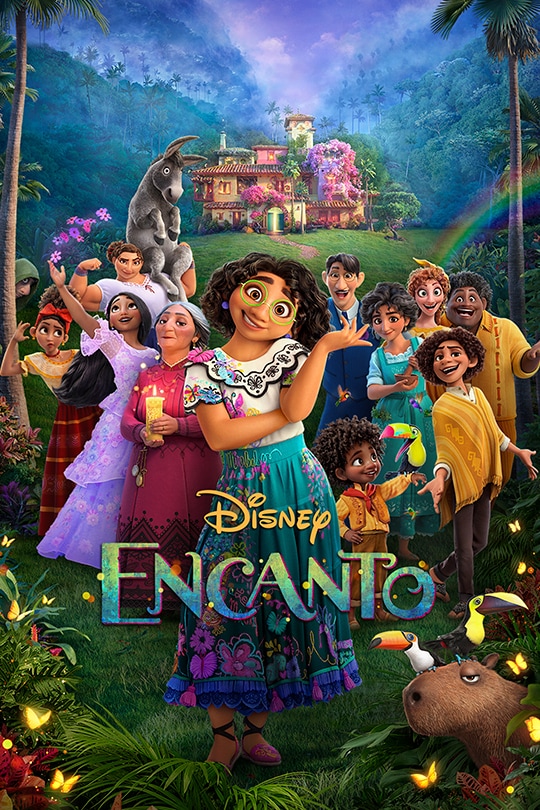Disney’s ‘Encanto’ is the embodiment of accurate representation
Analyzing the impact of the representation within “Encanto”
The “Encanto” movie poster features the Madrigal family, with Mirabel Madrigal as the focus of the picture
January 29, 2022
Incorporating a beautifully accurate depiction of immigrant culture, Disney’s 2021 production of “Encanto” provides refreshingly accurate insight into the lives of third generation immigrants of color.
The protagonist of the film is 15-year-old Mirabel Madrigal, voiced by Stephanie Beatriz. Each of Mirabel’s family members have a magical power. Her older sisters have gifts such as florakinesis — the power to mentally grow and manipulate flowers and plants — and superstrength. Mirabel, however, remains giftless, causing her to be shamed by her Abuela, or grandmother, her family and the village of Encanto that her family resides in.
Initially, Mirabel takes her lack of ability and the subsequent shaming in stride. But as the film progresses, Mirabel’s resilience begins to wane, revealing her underlying insecurity and jealousy.
As Mirabel grows increasingly unhappy with the fact that she is powerless, the casita begins crumbling, her sisters begin losing control of their powers and ultimately, the family’s true imperfection is revealed, tainting the family’s reputation. Although abstract, this chain of events reveals significant aspects of immigrant culture.
Isabela Madrigal
“I’m so sick of pretty — I want something true, don’t you?”
Isabela, the eldest of the three sisters, has always been the embodiment of perfection and is therefore expected to utilize her gift in a way that fits into this standard. Though her power allows her to grow any plant she desires, Isabela must only grow perfect roses in order to appease her Abuela’s expectations of flawlessness.
The standard of perfection is one that many immigrant children are pressured to fulfill. Be it to present themselves as the ideal role model for future generations or the perceived onus to make their ancestors’ immigration toils worthwhile by earning a stellar education or achieving immense career success, there is often a tremendous burden on the shoulders of immigrant children.
However, as Isabela grows to learn how she can create so much more than roses, including cacti, carnivorous plants and massive vines, she begins to uncover her true potential. Her realization serves as a message to children around the globe that perfection is meaningless if the perfect version of you isn’t the true one.
Luisa Madrigal
“I’m pretty sure I’m worthless if I can’t be of service.”
Luisa Madrigal, the middle sibling, feels another form of pressure. Luisa’s gift of super strength forces her to single handedly carry every physical and emotional burden handed to her. Her song “Surface Pressure” emphasizes the responsibility she feels to “shoulder” every object, problem and responsibility that her family cannot.
Numerous immigrant children on TikTok have voiced how Luisa’s character relates to the real-life struggles they face
The pressure to carry everything is also very relatable to many immigrant children around the globe. For the eldest children in immigrant families, this often extends to being assigned the role of an “additional parent” where they are expected to support the family far before their younger siblings. This forces older siblings to grow up quicker, stripping them of their childhood.
Mirabel Madrigal
“All I need is a chance.”
Mirabel is seen as the disappointment of the family — she is the only person who has not met Abuela’s base family standard of possessing a “gift.” Constantly excluded from family pictures and reprimanded when she tries to help, Mirabel’s inability to fulfill her grandmother’s expectations causes her to be treated as if she is inferior to the rest of the family.
Whereas her sisters embody standards that children feel forced to meet, Mirabel embodies the fear of not meeting others’ expectations and hence being rejected and condemned by them — a fear that shakes anyone, regardless of if they are an immigrant or not.
From Mirabel’s insecurity and belief that she is a disappointment, to the pressure Luisa feels to carry every expectation and the pressure Isabela feels to be perfect, the struggles embodied by the Madrigal family are a spectacular representation of the struggles of children who are are first- or second-generation immigrants, much like many MVHS students.
The Significance of Accurate Representation
Disney has evolved significantly throughout the years, becoming more inclusive in their depictions of minorities, and “Encanto” does a fantastic job in demonstrating how far Disney has come as a franchise. And, although the representation with“Encanto” does not automatically provide Disney with forgiveness for their long history of discrimination, the film is still beneficial as it finally validates the struggles that many minorities are forced to face rather than being insensitive towards them.
With today’s youth growing up alongside these strides in accurate minority representation, they are more likely to be confident in themselves, their culture and their own struggles rather than rejecting it out of fear that it is abnormal. With its nuance, vibrant characters and captivating plot, “Encanto” is a perfect example of how a little representation in media can go a long way in shaping the lives of those who consume it.



















